West Bank Outposts Israel Decided to Legalize Are on Disputed Lands
 Friday, February 24, 2023 at 02:24PM
Friday, February 24, 2023 at 02:24PM Clarifying the legal status of lands, a process which is required before declaring a piece of land as 'state land,' has not been done in the case of outposts that the Israeli cabinet voted to legalize on Sunday. The NGO Peace Now found that as many as 38 percent may be privately owned by Palestinians
by Hagar Shezaf 15 February 2023 Haaretz

Some of the illegal West Bank outposts that the Israeli cabinet voted on Sunday to authorize are on land with unclear ownership status, and may be privately owned, a review by Peace Now revealed.
A source involved in the authorization process confirmed that checks into the status of some lands have not been completed. Such a process is required by law before declaring any plot to be state land.
Peace Now found that of the 1,100 dunams (275 acres) over which the illegal outposts in question are spread, 420 dunams – or 38 percent – have an undetermined status. These include Givat Harel and Givat Arnon. In contrast, the reviews for Asael and Avigail have been completed. Out of 10 outposts, three are farms with few buildings, while others are localities with dozens of buildings.
Likewise, according to Peace Now, two of the outposts slated to be legalized – Avigail and Malachei Hashalom – are located partly inside military firing zones. Moreover, Peace Now officials said that some of the outposts had previously filed construction plans that had been rejected or frozen.
 APJP |
APJP |  Post a Comment |
Post a Comment |